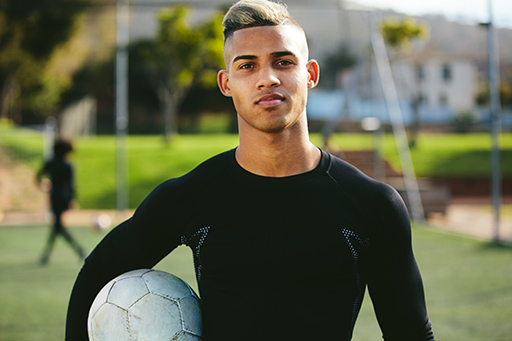4 Other strategies: coping with the unexpected

So far in this session you have explored how planning and preparation can be an effective strategy for helping athletes cope with transition. However, as you considered in Session 1, some career transitions can be unexpected and consequently difficult to plan for. So, what other strategies can help facilitate a smooth transition? You will try to answer this in the next activity.
Activity 4 Academy reject
Read the article Football’s biggest issue: the struggle facing boys rejected by academies [Tip: hold Ctrl and click a link to open it in a new tab. (Hide tip)] , which outlines some of the difficulties faced by young players dropped by football academies.
Now imagine you are supporting Max, an 18 year old footballer who has recently been dropped by the academy team that he played for. Max felt that he had been playing well and so was not expecting this news. He is struggling to accept the decision and come to terms with the transition to a new, possibly lower level, club. What would you recommend to help support Max through this transition?
Discussion
There are a wide range of strategies that you might have identified that could help Max through the transition. Based on what you have covered so far in this course you might have thought about other options available to Max such as playing for a new team, education or work.
Alternatively, you might have thought about psychological strategies. Strategies that have received research support and that could help Max include (Wylleman, Alfermann and Lavallee, 2004):
- counselling
- cognitive restructuring (e.g. replacing negative thoughts with positive ones)
- stress management techniques
- projective techniques (e.g.where an individual projects their thoughts and feelings onto an imaginary person or situation), and
- mentoring.
Max may benefit from working with a mentor who has perhaps been through a similar experience in the past. Hallmann et al. (2019) suggest that mentors can support athletes through career transitions by fulfilling several roles such as providing social support and being a role model.
Wylleman, Alfermann and Lavallee (2004) suggest that over the years the focus of helping athletes to cope with transition has moved away from traditional therapeutic approaches aimed at coping with the negative effects of transition. Instead, the focus has shifted to more holistic programmes, such as performance lifestyle programmes, which are aimed at preparation for transition and skill development. Career transitions are an inevitable part of the athlete’s journey through sport and it is important that athletes are prepared for these transitions and develop the skills to cope with them and thrive.
